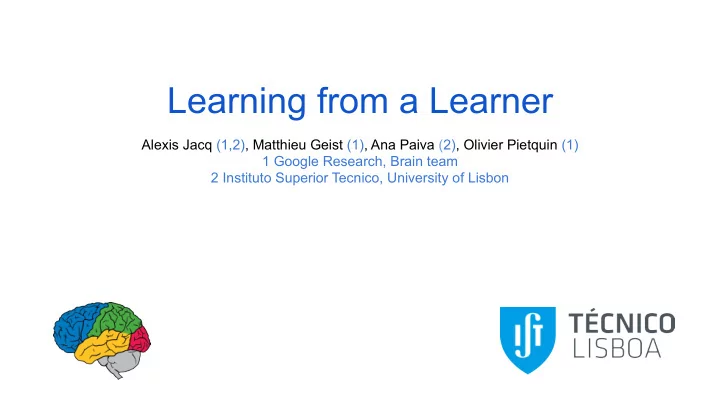

Learning from a Learner Alexis Jacq (1,2), Matthieu Geist (1), Ana Paiva (2), Olivier Pietquin (1) 1 Google Research, Brain team 2 Instituto Superior Tecnico, University of Lisbon
Goal: You want to learn an optimal behaviour by watching others learning t=20 Learner improvements t=0
Goal: You want to learn an optimal behaviour by watching others learning t=20 Infer Learner rewards t=0
Goal: You want to learn an optimal behaviour by watching others learning t=20 Infer Learner rewards Observer t=0 (after training with inferred reward)
Applications: - You can observe an agent that learns through RL but do not see its reward - You can observe somebody training but have limited access to the environment - You were able to build increasingly good policies for your task but can’t tell why
Assume the learner is optimizing a regularized objective:
The value of a state-action couple is given by the fixed point of the (regularized) bellman equation: And one can show that the softmax: is an improvement of the policy. Haarnoja, T., Zhou, A., Abbeel, P., and Levine, S. Soft actor-critic: Off-policy maximum entropy deep reinforcement learning with a stochastic actor. ICML, 2018.
Given the two consecutive policies, one can recover the reward function: Up to a shaping that does not modify the optimal policy of the regularized Markov Decision Process:
Result with exact soft policy improvements in gridworld:
Result with exact soft policy improvements in gridworld: Ground truth reward. Recovered reward function by inverting soft policy improvement. Knowing the reward is state-only.
Result with mujoco and proximal policy iterations: (Red) Evolution of the learner 's score during its observed improvements. (Blue) Evolution of the observer 's score when training on the same environment and using the recovered reward function.
Poster: 06:30 -- 09:00 PM Room Pacific Ballroom
Recommend
More recommend